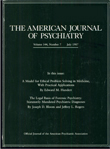Effects of the Jamison-Farabee consent decree: due process protection for involuntary psychiatric patients treated with psychoactive medication
Abstract
The Jamison-Farabee consent decree in California mandates an outside psychiatrist's review of involuntary medication of state hospital patients. Patients' rights advocates presumably hoped the decree would facilitate more frequent medication refusal, while clinicians predicted the procedure would impair patient care. Outside review led to only a 1.1% rate of medication denial; half of the patients involved deteriorated afterward. Examination of a sample of patients subject to the decree and two comparable samples 1 year and 10 years earlier suggests that patients' successful medication refusal was no more frequent after implementation of the decree and that the procedure had negligible effects on patient care or outcome for patients not denied medication.
Access content
To read the fulltext, please use one of the options below to sign in or purchase access.- Personal login
- Institutional Login
- Sign in via OpenAthens
- Register for access
-
Please login/register if you wish to pair your device and check access availability.
Not a subscriber?
PsychiatryOnline subscription options offer access to the DSM-5 library, books, journals, CME, and patient resources. This all-in-one virtual library provides psychiatrists and mental health professionals with key resources for diagnosis, treatment, research, and professional development.
Need more help? PsychiatryOnline Customer Service may be reached by emailing [email protected] or by calling 800-368-5777 (in the U.S.) or 703-907-7322 (outside the U.S.).



